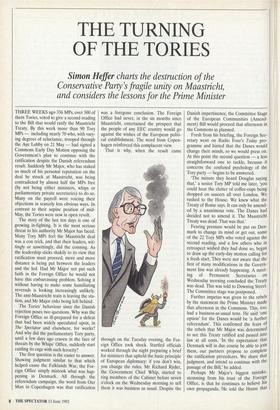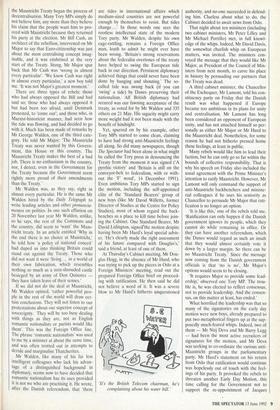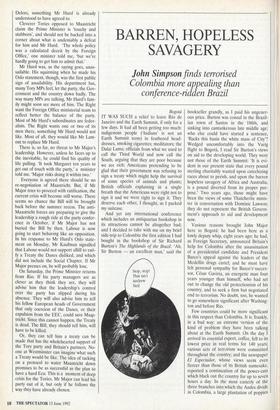THE TURNING OF THE TORIES
Simon Heifer charts the destruction of the Conservative Party's fragile unity on Maastricht, and considers the lessons for the Prime Minister
THREE WEEKS ago 336 MPs, over 300 of them Tories, voted to give a second reading to the Bill that would ratify the Maastricht Treaty. By this week more than 90 Tory MPs — including nearly 70 who, with vary- ing degrees of reluctance, trooped through the Aye Lobby on 21 May — had signed a Commons Early Day Motion opposing the Government's plan to continue with the ratification despite the Danish referendum result. Suddenly Mr Major, who has staked so much of his personal reputation on the deal he struck at Maastricht, was being contradicted by almost half the MPs free (by not being either ministers, whips or parliamentary private secretaries) to do so. Many on the payroll were voicing their objections in scarcely less obvious ways. In contrast to their supine position of mid- May, the Tories were now in open revolt.
The story of the last ten days is one of growing in-fighting. It is the most serious threat to his authority Mr Major has faced. Many Tory MPs feel the Maastricht deal was a con trick, and that their leaders, wit- tingly or unwittingly, did the conning. As the leadership sticks shakily to its view that ratification must proceed, more and more distance is being put between the leaders and the led. Had Mr Major not put such faith in the Foreign Office he would not have this embarrassing problem. Solving it without having to make some humiliating reversals is looking increasingly unlikely. The anti-Maastricht train is leaving the sta- tion, and Mr Major risks being left behind.
The Tories' behaviour since the Danish rejection poses two questions. Why was the Foreign Office so ill-prepared for a defeat that had been widely speculated upon, in The Spectator and elsewhere, for weeks? And why did the parliamentary Tory party, until a few days ago craven in the face of threats by the Whips' Office, suddenly start rattling its cage with such ferocity?
The first question is the easier to answer. Showing judgment similar to that which helped cause the Falklands War, the For- eign Office simply mistook what was hap- pening in Denmark. All through the referendum campaign, the word from Our Man in Copenhagen was that ratification
was a foregone conclusion. The Foreign Office had never, in the six months since Maastricht, entertained the prospect that the people of any EEC country would go against the wishes of the European politi- cal establishment. The word from Copen- hagen reinforced this complacent view.
That is why, when the result came
through on the Tuesday evening, the For- eign Office took shock. Startled officials worked through the night preparing a brief for ministers that upheld the basic principle of European diplomacy: if you don't win, you change the rules. Mr Richard Ryder, the Government Chief Whip, started to ring members of the Cabinet before seven o'clock on the Wednesday morning to tell them it was business as usual. Despite the Danish impertinence, the Committee Stage of the European Communities (Amend- ment) Bill would proceed that afternoon in the Commons as planned.
Fresh from his briefing, the Foreign Sec- retary went on Radio Four's Today pro-
gramme and hinted that the Danes would
change their minds, so we would press on. At this point the second question — a less
straightforward one to tackle, because it concerns the confused psychology of the Tory party — begins to be answered.
`The minute they heard Douglas saying that,' a senior Tory MP told me later, 'you could hear the clatter of coffee-cups being dropped on saucers all over London. We rushed to the House. We knew what the Treaty of Rome says. It can only be amend- ed by a unanimous vote. The Danes had decided not to amend it. The Maastricht Treaty was dead. That was that.'
Fearing pressure would be put on Den- mark to change its mind or get out, some of the 22 Tory MPs who voted against the second reading, and a few others who in retrospect wished they had done so, began to draw up the early-day motion calling for a fresh start. They were not aware that the first of many modifications in the Govern- ment line was already happening. A meet- ing of Permanent Secretaries on Wednesday morning concluded the Treaty was dead. This was told to Downing Street. The Committee stage was postponed. Further impetus was given to the rebels by the statement the Prime Minister made that afternoon in the Commons. This, too, had a business-as-usual tone. He said 'one option' for the Danes would be 'a further referendum'. This confirmed the fears of the rebels that Mr Major was determined to see this Treaty ratified and passed into law at all costs. 'In the expectation that Denmark will in due course be able to join them, our partners propose to complete
the ratification procedures. We share that judgment, and intend to continue with the passage of the Bill,' he added. Perhaps Mr Major's biggest mistake, stemming from his trust of the Foreign Office, is that he continues to believe his own propaganda. He told the House that
the Maastricht Treaty began the process of decentralisation. Many Tory MPs simply do not believe him, any more than they believe his claim that the people want him to pro- ceed with Maastricht because they returned his party at the election. Mr Bill Cash, an architect of the rebellion, intervened on Mr Major to say that Euro-citizenship was just about the most centralising concept imag- inable, and it was enshrined at the very start of the Treaty. Stung, Mr Major spat back that Mr Cash was 'wrong in almost every particular'. 'We knew Cash was right in almost every particular,' a new boy told me. 'It was not Major's greatest moment.'
There are three types of rebels: those who had always opposed the Bill and had said so; those who had always opposed it but had been too afraid, until Denmark protested, to 'come out'; and those who, in Marxist-historicist manner, had seen how the tide was flowing, and had decided to go with it. Much has been made of remarks by Mr George Walden, one of the third cate- gory. He told Mr Major: 'The Maastricht Treaty was never wanted by this Govern- ment, this House or this country. The Maastricht Treaty makes the best of a bad job. There is no enthusiasm in the country, nor, I detect, even in the Government for the Treaty because the Government seem rightly more proud of their amendments than the Treaty.'
Mr Walden was, as they say, right in almost every particular. He is the same Mr Walden hired by the Daily Telegraph to write leading articles and other pronuncia- mentos on politics. In one such effusion on 20 November last year Mr Walden, unlike, so he says, the rest of the Commons and the country, did seem to 'want' the Maas- tricht treaty. In an article entitled 'Why in the end there is no choice at Maastricht,' he told how 'a policy of national conceit' had duped us into thinking Britain could stand out against the Treaty. Those who did not want it were 'living ... in a world of their own fabrication, which resembles nothing so much as a mist-shrouded castle besieged by an army of Don Quixotes they have taken leave of their senses.'
If we did not do the deal at Maastricht, Mr Walden opined, 'rather powerful peo- ple in the rest of the world will draw cer- tain conclusions. They will not listen to our protestations about our superior concept of sovereignty. They will be too busy dealing with things as they are, not as English romantic nationalists or purists would like them'. This was the Foreign Office line.
The phrase 'romantic nationalists' was used to me by a minister at about the same time, and was often trotted out in attempts to deride and marginalise Thatcherites.
Mr Walden, like many of his far less intelligent colleagues who lack his advan- tage of a distinguished background in diplomacy, seems now to have decided that romantic nationalism has its uses provided it is not we who are practising it. He wrote, after the Danish referendum, that 'there are tides in international affairs which medium-sized countries are not powerful enough by themselves to resist. But tides change...' In those words one sees the rootless intellectual state of the modern Tory party. Mr Walden, despite his own cage-rattling, remains a Foreign Office man, loath to admit he might ever have been wrong. 'Britain's strong reservations about the federalist overtones of the treaty have helped to swing the European tide back in our direction. Persistent diplomacy achieved things that could never have been done by banging and shouting.' The so- called tide was swung back (if you can 'swing' a tide) by Danes preserving their nationalism. All British diplomacy had secured was our fawning acceptance of the treaty, as voted for by Mr Walden and 335 others on 21 May. His sagacity might carry more weight had it not been made with the benefit of hindsight.
Yet, spurred on by his example, other Tory MPs started to come clean, claiming to have had strong anti-Maastricht feelings all along. So did many newspapers, though The Spectator had been alone in what might be called the Tory press in denouncing the Treaty from the moment it was signed ('A pyrrhic victory' and 'Britain is still on the conveyor-belt to federalism, with or with- out the 'F' word', 14 December 1991). Even ambitious Tory MPs started to sign the motion, including the self-appointed elite of the 'Standard Bearers' group of new boys (like Mr David Willetts, former Director of Studies at the Centre for Policy Studies), most of whom regard the back- benches as a place to kill time before join- ing the Cabinet. One Standard Bearer, Mr David Lidington, signed the motion despite having been Mr Hurd's loyal special advis- er. 'He's clearly made the right assessment of his future compared with Douglas's,' said a friend, at least of one of them.
At Thtirsday's Cabinet meeting, Mr Dou- glas Hogg, in the absence of Mr Hurd, who was trying to pick up the pieces in Oslo at a Foreign Ministers' meeting, read out the prepared Foreign Office brief on proceed- ing with ratification. He then said he did not believe a word of it. It was a severe blow to Mr Hurd's hitherto unquestioned 'It's the British Telecom chairman, he's complaining about his water bill.' authority, and no-one succeeded in defend- ing him. Clueless about what to do, the Cabinet decided to await news from Oslo.
That night about ten ministers (including two cabinet ministers, Mr Peter Lilley and Mr Michael Portillo) met, in full knowl- edge of the whips. Indeed, Mr David Davis, the somewhat churlish whip on European matters, was invited. The ministers con- veyed the message that they would like Mr Major, as President of the Council of Min- isters from next month, to carve his place in history by persuading our partners that the Treaty was dead.
A third cabinet minister, the Chancellor of the Exchequer, Mr Lamont, told his con- stituency party on Friday that the Danish result was what happened if Europe became too ambitious in its plans for unity and centralisation. Mr Lamont has long been considered an opponent of European unity, and has not attached himself so per- sonally as either Mr Major or Mr Hurd to the Maastricht deal. Nonetheless, for some reason he had not hitherto pressed home these feelings, at least in public.
Many rebels would like him to lead their faction, but he can only go so far within the bounds of collective responsibility. That is why his speech on Friday also included the usual agreement with the Prime Minister's intention to ratify Maastricht. However, MI Lamont will only command the support of anti-Maastricht backbenchers and ministe- rial colleagues if he uses his seniority as Chancellor to persuade Mr Major that rati- fication is no longer an option.
`It is like this,' one of the rebels told me. 'Ratification can only happen if the Danish government ignores its people, which they cannot do while remaining in office. Or they can have another referendum, which the Danes would regard as such an insult that they would almost certainly vote it down by a larger margin. So there can be no Maastricht Treaty.' Since the message now coming from the Danish government officials is that `no is no', Mr Major's options would seem to be closing.
'It requires Major to provide some lead- ership,' observed one Tory MP. The trou- ble is, he was elected to reflect consensus, not to provide leadership. And the consen- sus, on this matter at least, has ended.'
What horrified the leadership was that so many of the signatories on the early day motion were new boys, already prepared to put two metaphorical fingers up at the sup- posedly much-feared whips. Indeed, two of them — Mr Nirj Deva and Mr Barry Legg
— had been the most active recruiters of signatures for the motion, and Mr Deva
was seeking to co-ordinate the various anti- Maastricht groups in the parliamentary party. Mr Hurd's statement on his return from Oslo that ratification would continue was hopelessly out of touch with the feel- ings of his party. It provoked the rebels to threaten another Early Day Motion, this time calling for the Government not to support the re-appointment of Jacques Delors, something Mr Hurd is already understood to have agreed to.
Cleverer Tories opposed to Maastricht claim the Prime Minister is 'touchy and stubborn', and should not be backed into a corner about what is undeniably a defeat for him and Mr Hurd. 'The whole policy was a calculated deceit by the Foreign Office,' one minister told me, 'but we're hardly going to get him to admit that.'
Mr Hurd was, as the saying goes, unas- sailable. His squirming when he made his Oslo statement, though, was the first public sign of assailability. His department has, many Tory MPs feel, let the party, the Gov- ernment and the country down badly. The way many MPs are talking, Mr Hurd's fam- ily might soon see more of him. The Right want the Foreign Office ministerial team to reflect better the balance of the party. Most of Mr Hurd's subordinates are feder- alists. The Right wants one or two of its men there, something Mr Hurd would not like. Most of all, they would like Mr Lam- ont to replace Mr Hurd.
There is, so far, no threat to Mr Major's leadership. However, unless he faces up to the inevitable, he could find his quality of life palling. 'It took Margaret ten years to get out of touch with the party,' a minister told me. 'Major risks doing it within two.'
Everyone is agreed there should be no re-negotiation of Maastricht. But, if Mr Major tries to proceed with ratification, the current crisis will become still worse. There seems no chance the Bill will be brought back before the summer recess. The anti- Maastricht forces are preparing to give the leadership a rough ride at the party confer- ence in October, if Mr Major has not buried the Bill by then. Labour is now going to start behaving like an opposition. In his response to Mr Hurd's Oslo state- ment on Monday, Mr Kaufman signalled that Labour would not support aBill to rati- fy a Treaty the Danes disliked, and which did not include the Social Chapter. If Mr Major presses on, he will probably lose.
On Saturday, the Prime Minister returns from Rio. If his party managers are as clever as they think they are, they will advise' him that the leadership's control over the party has slipped during his absence. They will also advise him to tell his fellow European heads of Government that only coercion of the Danes, or their expulsion from the EEC, could save Maas- tricht. Since this cannot happen, the Treaty is dead. The Bill, they should tell him, will have to be killed.
Or, they can tell him a treaty can be made that has the wholehearted support of the Tory party and Britain's partners. No- one at Westminster can imagine what such a Treaty would be like. The idea of tacking on a protocol to water Maastricht down promises to be as successful as the plan to have a hard Ecu. This is a moment of deep crisis for the Tories. Mr Major can lead his party out of it, but only if he follows the way they have already chosen.




















































 Previous page
Previous page